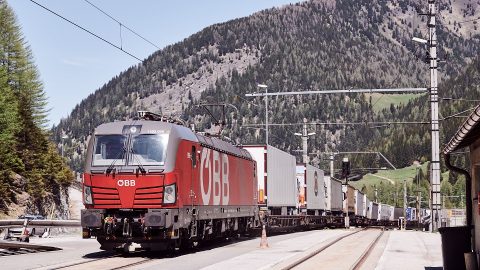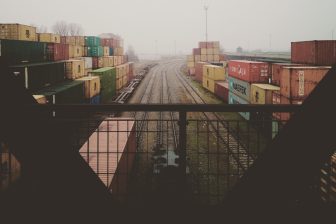
Toilet paper and alcohol: rail operator RCG makes sure you get it
If there are currently two products high in demand during the corona crisis, it is toilet paper and disinfectants. Rail Cargo Group welcomed two new customers that ask for the transport of paper and alcohol for disinfectants. “We are well aware of our responsibility: to deliver bio-ethanol for the production of the urgently needed disinfectant to the production sites as quickly as possible”, said Clemens Först, Chairman of the Board of Management of ÖBB Rail Cargo Group regarding the latter.
The increased demand for toilet paper is currently ensured by a record-breaking production of the Austrian hygiene products manufacturer Essity Austria, while the Austrian food and industrial goods group AGRANA shifted from delivering sugar to bio-ethanol, which is needed in disinfectants. Both are new customers for Rail Cargo Group, the rail freight operator of the Austrian ÖBB.
Paper transport
The country saw a delivery record of 6,000 pallets of toilet paper now that people are buying the precious commodity in bulk. Rail Cargo Group is meeting 15 per cent of this demand nationally and internationally. “Due to the international import restrictions in road freight transport, numerous deliveries to Germany and now also to Croatia and Serbia were shifted to rail.
“An additional 280 tonnes per week and previously 75 wagons could be provided within a few days upon request in order to guarantee supply. The supply of raw materials such as pulp and waste paper is also secured for the next weeks and months by rail transport”, the company said.
Alcohol demand
In order to meet the currently increasing demand for disinfectants, RCG recently also started transporting bio-ethanol rail to the production sites of various industrial manufacturers of disinfectants. The first deliveries were started last week and are now being successively expanded. “Rail transport thus enables the currently urgently needed production of disinfectants and thus contributes to the supply in Austria.”
“We are well aware of our responsibility, with the help of sustainable rail freight transport, to deliver bio-ethanol for the production of the urgently needed disinfectant to the production sites as quickly as possible, thus ensuring the supply in the trade and above all to the medical sites”. emphasises Först.
Also in the challenging times of the coronavirus, RCG ensures the supply of about 20 per cent of the total market share, the company points out. While maritime container traffic slumped, the rail freight business is moving full steam ahead.
Italy
This is true in particular for Italy, one of its main markets. Italy is currently facing the most severe outbreak of the coronavirus on Europe, and road restrictions are in place in several provinces. This makes it difficult for shippers to move freight by road. Moreover, truck drivers are reluctant to drive to Italy, some companies have reported.
Rail freight to and from Italy is a good and safe opportunity to move goods across the Alps, various rail freight operators have pointed out. And so does RCG. “We can currently assure you that the following intermodal TransFER connections to and from Italy are still in service: Munich-Trieste; Salzburg-Trieste; Villach-Trieste; Wels-Trieste; Trieste-Vienna-Linz-Trieste; Salzburg-Trieste-Graz-Salzburg; Verona-Lübeck and Vienna-Melzo.
“The Rolling Road (ROLA) on the Wörgl-Brenner route is operating; the frequency of its services are being determined based on capacity utilization on the part of forwarding agencies and truck drivers. The Trento-Wörgl ROLA route was temporarily suspended on 11th March. We are working on the possibilities of resuming services in consultation with our customers.
Other destinations
Services also remain up and running to the other countries within the network of RCG, such as Czech Republic, Slovakia, Hungary, Germany, Poland and Slovenia. In addition, a new service has been added to Croatia in cooperation with HZ Cargo and SZ Cargo.
“Traffic from Graz and Villach can be bundled and transported to all regions in Croatia without detours. The new connection also offers connections to Germany, the Czech Republic, Slovakia, Poland and Hungary.”
Crisis management
Additional measures have been taken to ensure safety and health of all staff. Freight trains are basically being reloaded at the borders of Italy, the Czech Republic and Slovakia. In this way, locomotives are not crossing the border, the company explains.
“For our operational personnel such as train drivers, wagon masters, technicians, etc., duty scheduling takes into account the interaction between shift changes and regulated absences”, RCG continues.
“Together with the occupational medicine department of the ÖBB Rail Cargo Group, we also conduct information events on precautionary measures at operationally critical locations. At these events, we inform our employees as well as customers about all relevant instructions, such as washing hands regularly and avoiding shaking hands. In order to maintain operations in the long term and reduce staff presence and contact frequency, the existing teleworking option was expanded and meetings replaced by digital alternatives.
Rail Cargo Group
RCG runs more than 500,000 trains a year, which makes about 1,400 freight trains a day. Three quarters of these trains run internationally. “We transport more than 100 million net tonnes annually on more than 50 million train kilometers. That corresponds to 1,300 circumnavigations of the earth.” RCG owns 653 locomotives, 25,698 Freight wagons, 10 logistics centres and 17 terminals (9 owned by RCG + 8 by ÖBB-Infra).
“A major competitive advantage is our nationwide production network with our own freight railways and our own employees in now twelve European countries. In addition to our home markets of Austria and Hungary, we already operate with our own traction in Italy, Germany, Bulgaria, Romania, Slovenia, Croatia, the Czech Republic, Slovakia, Greece and Poland”, the company notes.





